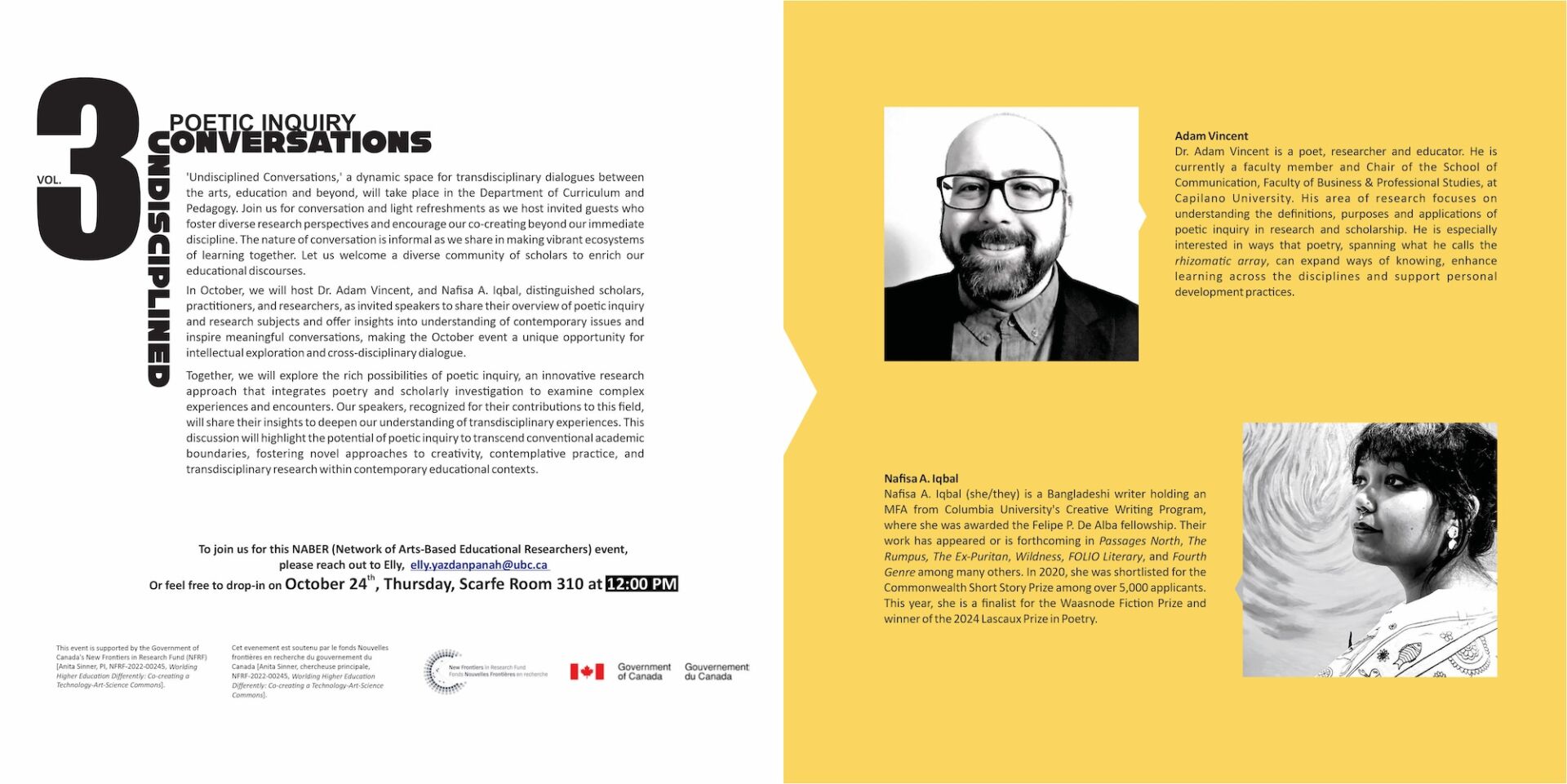Undisciplined Conversations Vol. III
We are pleased to invite you to our upcoming “Undisciplined Conversations,” a dynamic space for transdisciplinary dialogues across the arts, education, and beyond. This event will be hosted by the Department of Curriculum and Pedagogy at the University of British Columbia on October 24th, 2024, and will offer a unique opportunity for engaging in conversations with distinguished guests Dr. Adam Vincent and Nafisa A. Iqbal—renowned scholars, practitioners, and researchers recognized for their significant contributions to poetic inquiry. Together, we will delve into the possibilities of poetic inquiry, an innovative research method that intertwines poetry with scholarly inquiry to explore complex experiences.

We warmly invite you to join us in fostering vibrant learning ecosystems and enriching our educational dialogues with a diverse community of scholars. This will be an excellent opportunity for intellectual exploration and transdisciplinary exchange.
Opening the dialogue, Elly Yazdanpanah shared an excerpt from Sohrab Sepehri’s “The Oasis of Now.”
هر كجا هستم ، باشم،
آسمان مال من است.
پنجره، فكر ، هوا ، عشق ، زمين مال من است.
چه اهميت دارد, گاه اگر مي رويند قارچهاي غربت؟
من نمي دانم
كه چرا مي گويند: اسب حيوان نجيبي است ، كبوتر زيباست.
و چرا در قفس هيچكسي كركس نيست.
گل شبدر چه كم از لاله قرمز دارد.
چشم ها را بايد شست، جور ديگر بايد ديد.
واژه ها را بايد شست .
واژه بايد خود باد، واژه بايد خود باران باشد.
چترها را بايد بست.
زير باران بايد رفت.
فكر را، خاطره را، زير باران بايد برد.
No matter where I am,
the sky is mine,
the window, thoughts, air, love, earth,
all are mine.
No matter if the mushrooms of homesickness
keep popping now and then.
I don’t know why they say
horse is a noble animal, that
dove is lovely?
And why no one keeps a vulture in their birdcage?
Why is the clover flower seen as less than the red tulip?
Wash our eyes, we should,
see in a different light, we should.
Wash the words, we should.
The word for wind,
the wind itself should be,
the word for rain, the rain itself should be.
Fold the umbrellas, we should.
Walk under the rain, we should,
take with us our memories, ideas, we should.
Sepehri’s call to “wash our eyes” and “wash the words” invites us into a contemplative space where time, nature, and thought meet. In reading both the original Persian and its English translation, Elly recognized the nuances of linguistic diversity and honored how language enhances our discourse. This poetic lens embodies our theme, advocating for a more expansive, inclusive way of perceiving and interpreting the world.
Sepehri’s poetry dissolves the boundaries between observer and observed, much as arts-based educational research (ABER) does by blending art with academic exploration. His invocation of nature—the sky, rain, wind—serves as both metaphor and canvas, urging us to move beyond convention to embrace fluid, organic inquiry. Poetic inquiry similarly offers a non-linear path to knowledge creation, fostering a dynamic, responsive way of understanding.
With this perspective, Elly posed two questions to our esteemed speakers to begin the conversation:
- How does poetic inquiry create space for non-linear forms of knowledge that traditional research might overlook?
- Inspired by Sepehri, what does it mean to “see in a different light” in the realm of research?
Our guest speakers include:
- Dr. Adam Vincent: Poet, researcher, and educator, and Chair of the School of Communication at Capilano University. His work centers on poetic inquiry, exploring how poetry can enhance learning, expand knowledge, and foster personal growth across disciplines.
- Nafisa A. Iqbal: Bangladeshi writer with an MFA from Columbia University. Recognized for her fiction and poetry, Nafisa was shortlisted for the Commonwealth Short Story Prize and recently won the 2024 Lascaux Prize in Poetry. Her work appears in prominent literary journals worldwide.